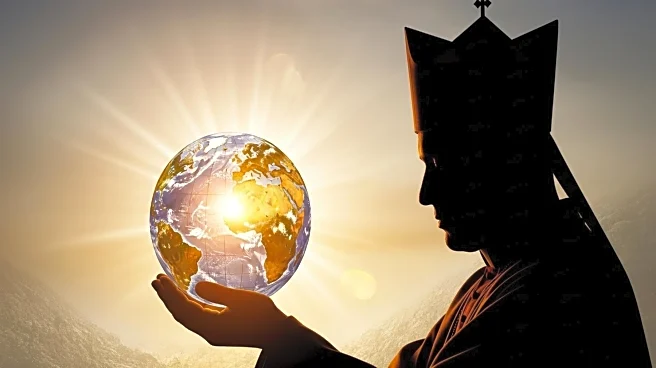What is the story about?
What's Happening?
Pope Leo XIV has criticized individuals who dismiss the seriousness of global warming, aligning himself with the environmental legacy of Pope Francis. During the 10th-anniversary celebration of Francis's ecological encyclical, Laudato Si, Leo addressed representatives from environmental and Indigenous groups, urging them to pressure national governments to adopt stricter environmental standards. He emphasized the importance of the upcoming UN climate conference in addressing the 'cry of the Earth and the cry of the poor.' Leo's comments come shortly after President Trump made false claims about global warming at the UN General Assembly, highlighting the ongoing debate over climate science and policies.
Why It's Important?
Pope Leo's remarks underscore the growing urgency in addressing climate change, particularly as world leaders prepare for the UN climate conference. His call for action highlights the moral and ethical dimensions of environmental stewardship, urging governments to implement binding targets to mitigate climate change. This stance challenges climate change sceptics and advocates for a transition to renewable energy sources. The Pope's influence could galvanize public opinion and policy shifts, impacting global efforts to combat climate change and protect vulnerable communities affected by environmental degradation.
What's Next?
The upcoming UN climate conference will be a critical platform for world leaders to discuss and potentially commit to stronger climate action. Pope Leo's advocacy may influence the conference's agenda, encouraging leaders to adopt more ambitious environmental policies. The Vatican's plan to establish a solar farm north of Rome, aiming to make Vatican City carbon-neutral, serves as a model for sustainable practices. Stakeholders, including governments and environmental groups, will likely respond to Leo's call for a change of heart and increased commitment to environmental causes.
Beyond the Headlines
Pope Leo's engagement with climate issues reflects a broader shift within religious communities towards environmental activism. His emphasis on the moral imperative to care for creation aligns with a growing movement that sees environmental stewardship as integral to faith. This perspective challenges traditional views and encourages a holistic approach to addressing global challenges, potentially influencing cultural attitudes and policy decisions worldwide.















